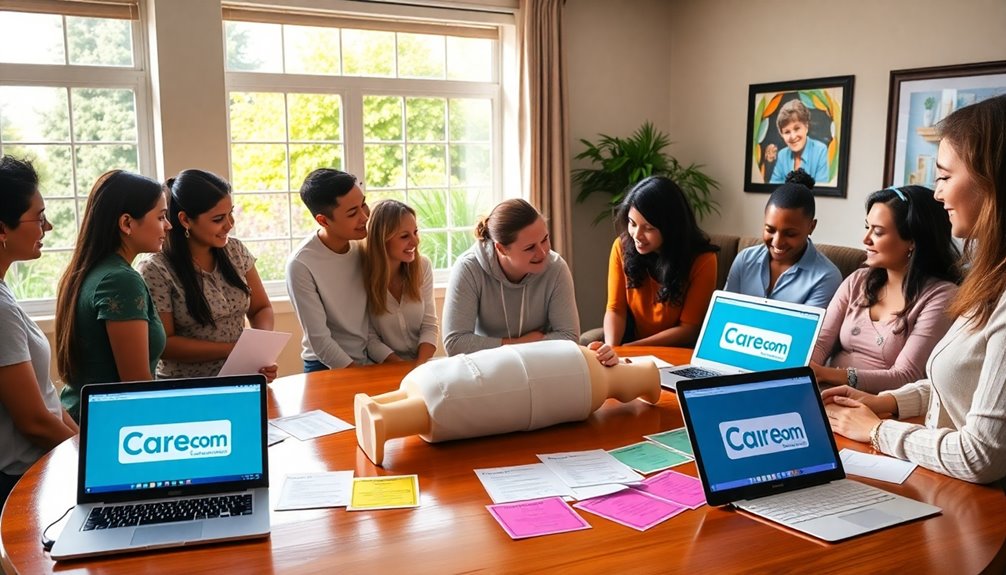To become a caregiver, start by evaluating your compatibility with essential traits like empathy and patience. Clarify the type of caregiving you want, such as home health aide or companion caregiver. Gain practical experience through volunteering and explore necessary training or certifications. Understand legal and ethical responsibilities, including client privacy. You can find job opportunities easily on Care. com, which connects you to various caregiving roles. Discover how to enhance your caregiving journey even further. Additionally, consider joining local support groups or online forums to share experiences and gain insights from others in the field. These communities can offer valuable advice on how to support a family caregiver, helping you to understand the unique challenges they face. Lastly, seek out ongoing education through workshops and courses, as continual learning will enhance your skills and make you a more effective caregiver.
Key Takeaways
- Assess your personal qualities and skills, such as empathy and patience, to determine your suitability for caregiving roles.
- Obtain necessary certifications, such as HHA or CNA, and complete training programs to enhance your caregiving skills and job prospects.
- Complete a criminal background check and familiarize yourself with HIPAA regulations to ensure compliance and client trust.
- Create a profile on Care.com to connect with clients, set your pay rates, and explore flexible job opportunities in caregiving.
- Gain practical experience through volunteering at nursing homes or senior centers to build interpersonal skills and confidence in caregiving.
Assess Your Compatibility

How do you know if caregiving is the right fit for you? Start by evaluating your compatibility with the role.
Successful caregivers embody empathy, patience, and adaptability, allowing them to offer effective support to clients with evolving needs. If you've cared for older family members, you may already possess a deeper understanding of what clients go through.
Focusing on personalized care and honoring individual preferences is key to building trust and ensuring client satisfaction. If you have a genuine passion for helping others and making a positive impact, caregiving might be your calling.
Be prepared to accommodate unique and changing requirements; this adaptability is essential for thriving in this rewarding career. Additionally, understanding the importance of emergency fund can provide financial stability as you transition into this new role.
Clarify the Type of Caregiving

When considering a caregiving role, it's vital to clarify the type of care you want to provide. As an in-home caregiver, you could choose among roles like Certified Home Health Aides (HHAs), Certified Nursing Assistants (CNAs), or Companion Caregivers.
HHAs can administer medications and offer companionship, while CNAs assist with medical tasks and personal care, requiring more formal training. If you prefer a less medical focus, Companion Caregivers primarily help with daily living activities.
Think about your personal interests and skills, as they'll guide you in selecting the right path. Additionally, effective communication in your client's primary language is vital for building trust and ensuring comfort during your caregiving interactions.
Explore Training and Certifications

As you consider becoming a caregiver, exploring certification programs is essential to enhance your skills and job prospects. Ongoing education helps you stay current with best practices in the field. Whether you're aiming for a Certified Home Health Aide or just seeking to improve your knowledge, the right training can make a significant difference. Additionally, understanding good grief can help you provide emotional support to those you care for during challenging times.
Certification Program Options
While pursuing a career in caregiving, you'll find various certification program options that can improve your skills and marketability.
Programs like Home Support Worker (HSW), Personal Support Worker (PSW), and Continuing Care Assistant (CCA) provide essential training in caregiver duties, often including job placements for hands-on experience.
If you're interested in becoming a Home Health Aide, you'll need certification through training programs offered by organizations like the National Association for Home Care & Hospice.
Certified Nursing Assistants undergo extensive training that varies by state, preparing you for clinical tasks.
Even if you're a companion caregiver, you'll benefit from training in CPR and first aid to guarantee safety.
These certifications can greatly boost your qualifications and job prospects.
Ongoing Education Importance
Certification programs lay a strong foundation for caregivers, but ongoing education is just as important for maintaining and enhancing those skills. Engaging in professional development helps you stay updated on best practices, improving the quality of care you provide.
Here are three key benefits of ongoing education:
- Skill Enhancement: Continued training in areas like CPR and first aid equips you to handle emergencies effectively.
- Career Advancement: Pursuing continuing education opportunities can open doors to specialized roles, such as nursing or advanced care positions.
- Real-World Experience: Programs like Home Support Worker (HSW) offer hands-on experience, further developing your caregiving abilities.
Investing in ongoing education not only preserves your certification but also guarantees your growth in the caregiving field.
Required Skills Development
To thrive as a caregiver, you'll need to develop a strong skill set through targeted training and certifications. Enroll in state-approved training programs like Certified Home Health Aide (HHA) or Certified Nursing Assistant (CNA) to acquire essential skills for client care and safety.
Certification courses, such as Personal Support Worker (PSW) or Home Support Worker (HSW), often provide hands-on training and job placements for practical experience. It's important to obtain CPR and first aid certifications, as they're essential for handling emergency situations.
Additionally, many programs emphasize interpersonal skills, helping you build rapport and communicate effectively with clients. Remember, ongoing education and professional development opportunities will keep you updated on best practices and evolving care needs.
Gain Practical Caregiving Experience

Gaining practical caregiving experience is essential for anyone looking to succeed in this rewarding field.
It not only enhances your skills but also prepares you for the demands of the job.
Here are three effective ways to gain experience:
- Enroll in a state-approved Certified Nursing Assistant (CNA) or Home Health Aide (HHA) program for essential training.
- Volunteer at local nursing homes or senior centers to develop your interpersonal skills while providing care to older adults.
- Complete relevant training programs, like CPR and first aid certifications, to boost your qualifications as a caregiver.
Understand Legal and Ethical Considerations

As a caregiver, you'll need to pass criminal background checks to guarantee you're trustworthy and reliable.
It's also essential to understand HIPAA compliance, which protects your clients' privacy.
Knowing these legal and ethical considerations will help you provide safe and respectful care.
Criminal Background Checks
While ensuring the safety of vulnerable populations, criminal background checks are a significant step in the caregiving process.
These checks confirm that caregivers are trustworthy and meet legal obligations. They typically include evaluations of criminal records, which help protect client privacy and uphold ethical responsibilities.
Here are three important aspects to take into account:
- Mandatory Checks: Caregivers must undergo state-approved criminal background checks.
- Reporting Abuse: Be aware of your responsibility to report suspected abuse, as many states require this by law.
- Compliance: Caregivers must follow HIPAA regulations to maintain confidentiality and protect client information. Additionally, understanding the legal guidelines for background checks is crucial for ensuring compliance with state laws.
Understanding these elements is essential for maintaining professional standards and ensuring client safety.
HIPAA Compliance Requirements
How can caregivers guarantee they're protecting their clients' privacy? By adhering to HIPAA regulations, you guarantee patient privacy and confidentiality in all interactions. This compliance isn't just a legal obligation; it reflects your ethical responsibility as a caregiver.
Understand that any HIPAA violations can lead to hefty fines and even criminal charges, so it's crucial to keep sensitive information secure.
Additionally, you must report any suspected abuse or neglect. This duty not only safeguards your clients but also reinforces the trust they place in you.
Familiarizing yourself with HIPAA guidelines helps you navigate the complexities of sharing medical information, ultimately fostering a safe and respectful environment for those you serve.
Develop Key Skills as a Caregiver

Developing key skills as a caregiver is essential for providing the best support to clients. Strong interpersonal skills, effective communication, and relationship-building abilities help you connect with those in your care.
Here are three critical areas to focus on:
- Health and Safety Practices: Learn food hygiene and first aid techniques to handle emergencies and guarantee client well-being.
- Mobility Assistance: Master techniques for safely helping clients with mobility, which promotes independence and prevents injuries.
- Professional Development: Engage in ongoing education and stay updated on caregiving best practices to enhance your service quality.
Discover Pay and Job Prospects

What can you expect regarding pay and job prospects as a caregiver? In-home caregivers typically earn an average hourly wage ranging from $14 to $25, with potential increases for night or weekend shifts.
The demand for care jobs is growing, especially in senior care, leading to numerous job opportunities and favorable prospects. You'll find flexibility in your job selection, as roles span various categories like child care and companionship.
Many caregivers can negotiate compensation based on their skills and experience, allowing for potentially higher earnings. Plus, with a workforce shortage in the caregiving sector, there's great potential for career advancement through additional training and certifications.
Embrace the possibilities this rewarding field offers!
Learn About Home Care Providers

Are you curious about the different roles within home care providers? Understanding these roles can help you decide which path to pursue. Here are three key positions:
- Certified Home Health Aides (HHA): They assist with daily living activities and can administer medications.
- Certified Nursing Assistants (CNA): This role requires more training and certifications, varying by state, but offers thorough care.
- Companion Caregivers: They focus on companionship and light housekeeping, needing less formal training, but certifications can improve job prospects.
With the aging population driving demand, job opportunities are plentiful in this field. Additionally, understanding tax implications of IRAs can help you manage your finances better as you pursue a caregiving career.
Effective communication in the client's primary language is vital for home care providers to guarantee comfort and understanding.
Find Caregiver Opportunities on Care.com

Finding caregiver opportunities on Care.com can be a game-changer for those looking to enter the field or expand their current roles. The platform connects you with a diverse range of caregiving services, including child care, senior care, housekeeping, and more.
With over 17 million caregivers, you'll find flexible job options that fit your schedule, whether full-time, part-time, or occasional. You can easily search results for caregiving jobs through the Care.com app and apply directly.
Plus, you have the freedom to set your own personal pay rates, ensuring you're compensated fairly. The site also prioritizes safety with background checks and a dedicated team, enhancing trust for both caregivers and families alike. Additionally, many caregivers find that incorporating texting humor into their communication helps build rapport with seniors and alleviate feelings of isolation.
Frequently Asked Questions
How Do Caregivers Get Paid on Care Com?
Caregivers on Care.com get paid directly from families, using a secure platform for transactions.
You can set your own hourly rate, typically ranging from $14 to $25, depending on your experience and the services you provide.
Payments can come through checks, cash, or electronic transfers, based on the family's preference.
If you opt for a premium membership, you might also enjoy waived background check fees, boosting your chances for higher earnings.
How Much Do Family Members Get Paid for Caregiving?
Did you know that family caregivers in California can earn between $8 and $21 per hour? The pay for family members providing care varies widely based on location and the specific needs of the person receiving care.
Programs like Medicaid and veterans' benefits help compensate caregivers, ensuring they receive some financial support. Additionally, tax credits can ease the burden, offering up to $3,000 in certain states, making caregiving a bit more manageable.
How Much Does Care Com Cost for Caregivers?
Care.com offers a Basic Membership for caregivers at no cost, letting you create a profile and search for jobs.
If you want more benefits, consider the Premium Membership, which usually costs around $39 per month. This option boosts your visibility and gives you priority job alerts.
Plus, it waives background check fees, helping you build trust with families. Always check the Care.com app for the latest pricing and membership details.
How Do I Become a Caregiver With No Experience?
To become a caregiver with no experience, you can start by enrolling in a state-approved training program like HHA or CNA.
Volunteering at nursing homes helps you gain practical skills and build empathy.
Highlight your reliable, compassionate nature on your profile to attract potential employers.
Completing basic first aid and CPR training can also boost your appeal.
With dedication and a willingness to learn, you can successfully enter the caregiving field.
Conclusion
Becoming a caregiver can be a fulfilling journey that coincidentally aligns with your passion for helping others. As you explore opportunities on platforms like Care.com, you'll not only gain valuable experience but also connect with families in need. Remember, every skill you develop and every certification you earn brings you closer to making a real difference in someone's life. So, whether it's a neighbor or a stranger, your caring touch could be just what they need.









